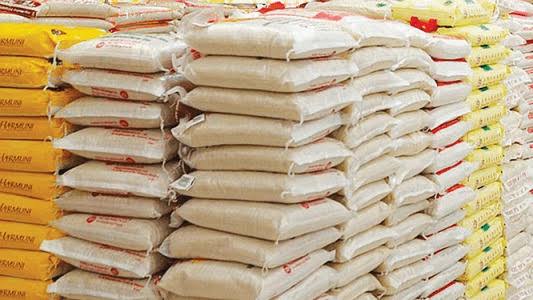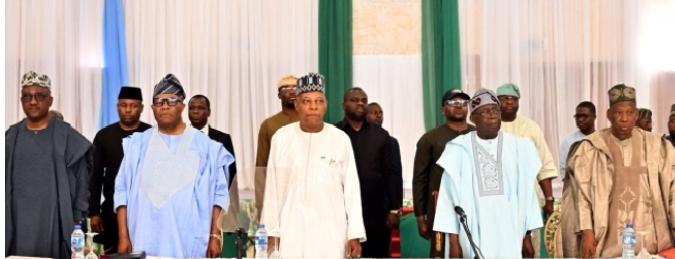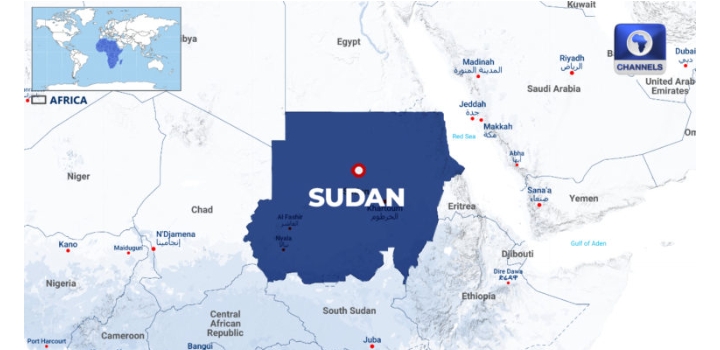News
Citizens Groan As Rice Hits N77,000 Per Bag

This is not the best of times for Nigerian families, who have had to adopt bizarre cost-cutting measures to cope with the recent hardship occasioned by the dramatic hike in the prices of goods and services.
Several of them lamented that their income could no longer take care of their daily needs, adding that the prices of staples had almost tripled in the market. Rice, which is arguably one of the commonest consumed staples in the country, has risen to N77,000 per bag.
In December, the National Bureau of Statistics stated that the country’s inflation rate hit a 27-year high as headline inflation rose to 28.9 per cent.
The December headline inflation rate showed an increase of 0.72 percent when compared to the previous month’s rate.
In recent years, food prices have been on the rise across Nigeria. The situation deteriorated due to the impact of government policies such as the removal of subsidy on petrol and the free fall of the naira in the foreign exchange market.
Foodstuffs sellers in major cities, who spoke to Sunday PUNCH, lamented that the cost of a bag of rice had risen almost 200 per cent.
Sunday PUNCH gathered that long grain rice, which used to sell for between N45,000 and N50,000 in November, now costs over N70,000, putting a huge pressure on the consumers.
The unprecedented increase in the prices of commodities has caused nationwide hardship, with residents of some major cities taking to the streets to register their displeasure.
From Kano to Niger, Rivers to and Osun, residents protested the hardship on the streets.
In Niger State, for instance, residents of Suleja took to the street last Wednesday to register their displeasure over the high cost of living in the country.
Wednesday’s protest came two days after a similar protest in Minna, the state capital.
The Organised Labour on Friday insisted on embarking on an industrial action to register its displeasure over the current economic hardship in the country.
Although the Federal Government has ordered the distribution of grains and other items to cushion the effects of the economic crisis across the country, citizens are still grappling with the hike in the prices of commodities.
Lagos residents lament
In Lagos, some residents, who spoke to one of our correspondents, lamented that the incessant increase in the prices of foodstuffs had strained their finances.
This is as they urged the government to intervene before things got out of hand.
A mother of two, Mrs Mede Orunmade, said this present situation had made life unbearable for her and her family.
Orunmade stated that it was as though the country was at war, adding that the hike in the prices of foodstuffs was continuous.
She said, “It has been a hard time for me and my family. The country hasn’t been in the right position for the past eight months. I have been struggling with my family to clear up our electricity bills. Coupled with the ever-rising price of foodstuffs, I don’t know if I am going to survive.
“I used to operate an online business but it has packed up. There’s no gain on any business in Nigeria like before anymore. I am just striving to survive.
“The surprising thing is that a small carton of noodles is now N7,000 to N7,800. We used to buy it for between N1,900 and N2,000 in the past. It is so shocking that the price of a bag of rice continues to change almost every minute.
“A bag of rice five months ago was around N49,000, but it increased to N68,000. As of yesterday (Thursday), my supplier said it had risen to N70,000. The cheapest thing we used to buy before, garri, is now N2,500 for a paint bucket. It was N800 before.”
Another Lagos resident and father of four, Mr Taiwo Babatunde, said he could no longer afford to feed his family like he used to.
He asked the government to come to her aid, as her suffering was becoming too much.
A housewife simply identified as Wunmi said, “The government needs to come to our aid now as everything is very hard. A bag of beans is now N65,000, which is three times the price it used to be. Also, groundnut oil is now N8,400 for four litres, and a bag of rice is now N70,000.
“This is getting too much. We hope the government will come to help us.”
Further findings by our correspondents revealed that a kilogramme of Semovita, which sold for N800 four months ago, now sells for N1,200.
The price of beans also increased from around N1,500 to N4,200 per tin.
Some women, who spoke to one of our correspondents at the Ibafo Market, Ogun State, lamented the difficulties they were facing in purchasing items from the market with little resources.
A trader, Mrs Bamise Olaiya, said, “The prices of the foodstuffs are just annoying. I came to the market with N8,000 to buy some food items but the prices have changed between last week and now. Just last week, I bought three portions of tomatoes for N1,200 and pepper for N1,000, but today I have spent N4,200 for the same items. Pepper grinding has also increased from N200 to N300.”
Businesses struggling – Traders
Entrepreneurs across various sectors are feeling the pinch as they struggle to navigate through the challenging times.
A skincare consultant, Mr Damilola Olasunkanmi, said the current economic situation had almost put her out of business.
“I don’t get customers like I used to. My customers are cutting down on skincare purchases to prioritise other essentials like food and transportation, and that is affecting sales significantly. Restocking has become a daunting task as costs continue to soar,” he said.
Similarly, a dental therapist managing a private clinic in Iwo, Osun State, Dr Oluwafemi Ogunsakin, noted that the surge in the cost of his services had deterred patients from seeking dental care.
A foodstuffs retailer, Mrs Ore Ilerioluwa, lamented that the increase in prices had continued to threaten the operation of her business.
She said, “I buy foodstuffs from the market wholesale and sell them in a little shop I run at home. But these daily changes in the prices of items are affecting me so much that I find it difficult to buy the items.
“Do you know that three days ago I bought a carton of spaghetti for N13,000, today I was told it was N14,000. Now, when you add to the cost of each one today, by the time you return, the prices will have gone up again.
“So, you will be forced to add more money. A bag of beans is now N120,000, whereas it was N70,000 before. People are going for anything cheap now. Many families are hungry.”
Another foodstuffs seller at the Magboro Market in the Obafemi-Owode Local Government Area, Ogun State, Sukurat Akanni, complained that prices of many items had doubled.
Another trader, Adeola Israel, noted that a bag of brown beans had increased to N62,000, while a paint rubber now costs N6,200.
She lamented that she no longer made as much sales as she used to in the past.
Govt concerned – A’Ibom
The Akwa Ibom State Governor, Umo Eno, said that his administration had concluded plans to establish a bulk purchase agency to regulate prices of foodstuffs and bring them within the reach of the citizens.
The governor announced this on Friday during the Nigerian Unity Conference 2024 tagged, ‘That We May be One’, organised by the 10th Episcopal District, Christian Methodist Episcopal Church, at the Ibom Hall, Uyo.
The governor announced this on Friday during the Nigerian Unity Conference 2024 tagged, ‘That We May be One’, organised by the 10th Episcopal District, Christian Methodist Episcopal Church, at the Ibom Hall, Uyo.
He said that a bill to establish the agency would soon be sent to the state House of Assembly for legal backing to enable the agency to intervene and stem skyrocketing food prices in the state.
Kwara gives palliatives
The Kwara State Government delivered 10,000 bags of 10kg rice to labour unions for onward distribution to their members.
This was disclosed by the Chief Press Secretary to the Governor, Rafiu Ajakaye, on Friday, following an engagement with Governor AbdulRahman AbdulRazaq.
In their separate remarks, the state chairmen of the Trade Union Congress, Joseph Meshach, and the Nigerian Labour Congress, Saheed Olayinka, commended the governor for his continuous efforts to provide relief to the people in the state
Anambra residents groan
Residents of Anambra State are battling with the soaring costs of food items like rice, beans, garri, palm oil, tomatoes, onions, fruits, and others in the various markets across the state.
One of our correspondents, who spoke to residents and marketers in Awka, the state capital, and Onitsha on Saturday, gathered that the high cost of items was attributed to the rise in the value of the dollar, just as the situation dampened the mood of the people and forced them to ration food.
A visit to the Relief Market in Onitsha, and the Eke-Awka Market in Awka, showed that a 50kg bag of foreign rice was sold for N72,000 as against N51,000 a month ago. A full bag of iron beans was sold for N110,000 as against N89,000 a month ago
News
Amaewhule, 26 Other Lawmakers Never Defected To APC, Rivers Chair Confirms

By Kayode Sanni-Arewa
The Rivers State chapter of the All Progressives Congress (APC) states the obvious that 27 members of the State House of Assembly never defected to APC .
Rivers APC chairman Chief Tony Okocha, dismissed claims that the lawmakers had defected to the APC from PDP.
Okocha also denied receiving the lawmakers into the APC, saying what happened at the Port Harcourt Polo Club in December 2023 was not a reception for the 27 lawmakers.
He said the December event attended by the lawmakers was to celebrate the constitution of the state executive council of the APC by the party’s national body.
While addressing a news conference in Port Harcourt on Tuesday, Okocha said he personally invited the lawmakers individually as friends for the 2023 event and not as Assembly members.
He said, “There was no intention to organise a reception for what we were not holding. We were inaugurated in Abuja and we chose to organise a reception and thanksgiving for our members.
It was not to receive the 27 lawmakers. We were misinterpreted to have received the 27 lawmakers into the APC. That is not correct.
“We invited individual members of the Assembly. I have a relationship with them over time. We tried to woo them into the party. I was intentional in reaching out to them to join us. We would have counted it all joy if we had succeeded.”
Okocha continued, “We want to tell Nigerians that the 27 lawmakers led by Martin Amaewhule never defected to the All Progressives Congress.
“What people flaunt on social media or television cannot put a plausible argument for them.
“The law is not about emotions. It is as strict as it is.”
He accused Governor Siminalayi Fubara of disobeying the rule of law at all times, saying “The era of strong man mentality is gone. The law has taken its place.
“There is no way a High Court can sit in judgment over a superior Court of Appeal. It is not done. It is a pity that senior lawmakers in this country will now come out to misinterpret the court judgment.”
Okocha further accused the governor of exhibiting dictatorial tendencies in his refusal to obey the court judgment which authorised him to re-present the 2024 budget before the Amaewhule-led House of Assembly.
“We are disenchanted by the governor’s disrespect for the rule of law. Justice James Omotosho granted 15 reliefs in his judgment but the governor has refused to obey them.
“You cannot run the state without an annual budget. But the governor is doing so. You cannot present a budget before a three-man Assembly. The Appeal Court called it a forum,” Okocha stated.
He, however, called for calm and expressed optimism that the parties would obey when the Supreme Court finally rendered judgment on the matter.
News
Ex-President, Buhari, El-Rufai, Amaechi Absent As APC Holds NEC Meeting

By Kayode Sanni-Arewa
Ex-President Muhammadu Buhari, former Minister of Transportation, Roti mi Amaechi and ex-Governor of Kaduna, Nasr El-Rufai are missing as APC holds NEC meeting.
This is coming just as leaders of the ruling All Progressives Congress (APC) have arrived at the National Secretariat of the party for its National Executive Committee (NEC) meeting in the nation’s capital, Abuja.
All roads leading to the venue of the meeting on Blantyre Street were cordoned off by a combined team of armed security men including soldiers from the Guards Brigade.
Vehicular and human movements on Blantyre Street were also restricted just as journalists were kept outside despite the release of an accredited list of reporters on Wednesday morning by the party spokesman, Felix Morka.
Some early arrivals at the venue include all National Working Committee (NWC) members; Forum of State Chairmen; former governor of Zamfara State, Abdulaziz Yari; Minister of Budget and National Planning, Atiku Bagudu; and Deputy Speaker, Benjamin Kalu.
Governors of Edo, Benue, Ondo, Ekiti, Kaduna, Jigawa, Nasarawa, Yobe, Niger, Lagos, Kogi, Ogun, Imo, deputy governor of Ebonyi and former governors of Kogi, Kebbi, Niger, Zamfara, and Plateau were in attendance.
Conspicuously absent from the NEC meeting were former President Muhammadu Buhari; former Governor of Kaduna State, Nasir El-Rufai; and former Governor of Rivers State and ex-Minister of Transport, Rotimi Amaechi.
The leader of the party, President Bola Tinubu, Vice President Kashim Shetimma, Senate President Goodwill Akpabio, and Speaker Tajudeen Abbas arrived at the venue at noon. The meeting was presided over by APC National Chairman Abdullahi Ganduje
The NEC meeting, the first since Tinubu’s assumption of office in May 2023, comes a day after the national caucus meeting of the party at the Presidential Villa also in Abuja.
Some APC chieftains including El-Rufai and an ex-National Vice Chairman of the party Salihu Lukman had complained about the lack of internal democracy in the ruling.
News
SAD! 46 Killed As Sudan Military Plane Crashes Into Civilians Neighborhood

By Kayode Sanni-Arewa
Forty-six people were killed when a Sudanese military transport plane crashed into a residential neighbourhood on the outskirts of Khartoum, the regional government said Wednesday.
The Antonov aircraft went down on Tuesday night near Wadi Seidna air base, one of the army’s largest military hubs in Omdurman, northwest of the capital.
The army, which has been at war with the paramilitary Rapid Support Forces (RSF) since April 2023, said the plane crashed during takeoff, killing and injuring both military personnel and civilians.
“After a final tally, the number of martyrs reached 46, with 10 injured,” the Khartoum regional government’s media office said in a statement.
The army-aligned health ministry had previously reported at least 19 dead
Witnesses described hearing a loud explosion and seeing several homes damaged in the area. The crash also caused power outages in nearby neighbourhoods.
The ministry said emergency teams rushed injured civilians, including children, to a nearby hospital.
A military source cited a technical malfunction as the cause of the crash, speaking to AFP on condition of anonymity because they were not authorised to comment to the media.
– Army Advances –
The crash came a day after the RSF claimed responsibility for shooting down a Russian-made Ilyushin aircraft over Nyala, the capital of South Darfur
The paramilitary group said the plane was destroyed with its crew onboard.
The recent escalation follows significant advances by the army in central Sudan and the capital Khartoum in its multi-front offensive against the RSF.
Late on Saturday, RSF signed a charter with allied political and armed groups in Nairobi, Kenya, paving the way for the formation of a parallel government in rebel-held areas.
Since April 2023, army chief Abdel Fattah al-Burhan and his former deputy and RSF commander Mohamed Hamadan Daglo, once allies, have been locked in a deadly power struggle.
The war, which has claimed tens of thousands of lives, erupted after a rift emerged between Burhan and Daglo over the future structure of the government.
The conflict has triggered one of the world’s worst humanitarian disasters in recent memory, according to the United Nations.
The fighting has devastated Khartoum and other major cities, displacing over 12 million, plunging the country into hunger and crippling critical infrastructure.
AFP
-

 News24 hours ago
News24 hours agoUS dumps UK, others from visa-free entry for 2025
-

 News24 hours ago
News24 hours agoSad! Midnight f!re engulfs Ladipo, Owode Onirin markets in Lagos
-

 News15 hours ago
News15 hours agoNigerian Professional Footballer Abubakar Lawal Dies in Uganda
-

 Metro11 hours ago
Metro11 hours agoSHOCKING! Auto crash claims lives of groom, bride’s sister
-

 News22 hours ago
News22 hours agoReps Advocate Tax Exemption, Better Support for Persons With Disabilities
-

 News23 hours ago
News23 hours agoTransporter Frowns At PTD Strike, Says Union Will Force Govt To Use Rail As Mobility Alternative In Lifting Petroleum Products
-

 News16 hours ago
News16 hours agoSouth-East Caucus Urges NAFDAC to Reopen Onitsha Medicine Market, Target Offenders
-

 Sports14 hours ago
Sports14 hours agoChelsea emphatic win against Southampton gives them hope of top four finish







